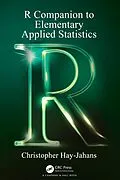The R Companion to Elementary Applied Statistics includes traditional applications covered in elementary statistics courses as well as some additional methods that address questions that might arise during or after the application of commonly used methods. Beginning with basic tasks and computations with R, readers are then guided through ways to bring data into R, manipulate the data as needed, perform common statistical computations and elementary exploratory data analysis tasks, prepare customized graphics, and take advantage of R for a wide range of methods that find use in many elementary applications of statistics.
Features:
- Requires no familiarity with R or programming to begin using this book.
- Can be used as a resource for a project-based elementary applied statistics course, or for researchers and professionals who wish to delve more deeply into R.
- Contains an extensive array of examples that illustrate ideas on various ways to use pre-packaged routines, as well as on developing individualized code.
- Presents quite a few methods that may be considered non-traditional, or advanced.
- Includes accompanying carefully documented script files that contain code for all examples presented, and more.
R is a powerful and free product that is gaining popularity across the scientific community in both the professional and academic arenas. Statistical methods discussed in this book are used to introduce the fundamentals of using R functions and provide ideas for developing further skills in writing R code. These ideas are illustrated through an extensive collection of examples.
About the Author: Christopher Hay-Jahans
Autorentext
Christopher Hay-Jahans received his Doctor of Arts in mathematics from Idaho State University in 1999. After spending three years at University of South Dakota, he moved to Juneau, Alaska, in 2002 where he has taught a wide range of undergraduate courses at University of Alaska Southeast.
Klappentext
The R Companion to Elementary Applied Statistics includes traditional applications covered in elementary statistics courses as well as some additional methods that address questions that might arise during or after the application of commonly used methods. Beginning with basic tasks and computations with R, readers are then guided through ways to bring data into R, manipulate the data as needed, perform common statistical computations and elementary exploratory data analysis tasks, prepare customized graphics, and take advantage of R for a wide range of methods that find use in many elementary applications of statistics.
Features:
- Requires no familiarity with R or programming to begin using this book.
- Can be used as a resource for a project-based elementary applied statistics course, or for researchers and professionals who wish to delve more deeply into R.
- Contains an extensive array of examples that illustrate ideas on various ways to use pre-packaged routines, as well as on developing individualized code.
- Presents quite a few methods that may be considered non-traditional, or advanced.
- Includes accompanying carefully documented script files that contain code for all examples presented, and more.
R is a powerful and free product that is gaining popularity across the scientific community in both the professional and academic arenas. Statistical methods discussed in this book are used to introduce the fundamentals of using R functions and provide ideas for developing further skills in writing R code. These ideas are illustrated through an extensive collection of examples.
About the Author:
Christopher Hay-Jahans
received his Doctor of Arts in mathematics from Idaho State University in 1999. After spending three years at University of South Dakota, he moved to Juneau, Alaska, in 2002 where he has taught a wide range of undergraduate courses at University of Alaska Southeast.
Inhalt
- Preliminaries
- Bringing Data Into and Out of R
- Accessing Contents of Data Structures
- Altering and Manipulating Data
- Summaries and Statistics
- More on Computing with R
- Basic Charts for Categorical Data
- Basic Plots for Numeric Data
- Scatterplots, Lines, and Curves
First Steps
Running Code in R
Some Terminology
Hierarchy of Data Classes
Data Structures
Operators
Functions
R Packages
Probability Distributions
Coding Conventions
Some Book-keeping and Other Tips
Getting Quick Coding Help
Entering Data Through Coding
Number and Sample Generating Tricks
The R Data Editor
Reading Text Files
Reading Data from Other File Formats
Reading Data from the Keyboard
Saving and Exporting Data
Extracting Data from Vectors
Conducting Data Searches in Vectors
Working with Factors
Navigating Data Frames
Lists
Choosing an Access/Extraction Method
Additional Notes
More About the attach Function
About Functions and their Arguments
Alternative Argument Assignments in Function Calls
Altering Entries in Vectors
Transformations
Manipulating Character Strings
Sorting Vectors and Factors
Altering Data Frames
Sorting Data Frames
Moving Between Lists and Data Frames
Additional Notes on the merge Function
Univariate Frequency Distributions
Bivariate Frequency Distributions
Statistics for Univariate Samples
Measures of Central Tendency
Measures of Spread
Measures of Position
Measures of Shape
Five-Number Summaries and Outliers
Elementary Five-Number Summary
Tukey's Five-Number
The boxplotstats Function
Computing with Numeric Vectors
Working with Lists, Data Frames and Arrays
The sapply Function
The tapply Function
The by Function
The aggregate Function
The apply Function
The sweep Function
For-loops
Conditional Statements and the switch Function
The if-then Statement
The if-then-else Statement
The switch Function
Preparing Your Own Functions
Preliminary Comments
Bar Charts
Dot Charts
Pie Charts
Exporting Graphics Images
Additional Notes
Customizing Plotting Windows
The plotnew and plotwindow Functions
More on the paste Function
The title Function
More on the legend Function
More on the mtext Function
The text Function
Histograms
Boxplots
Stripcharts
QQ-Plots
Normal Probability QQ-Plots
Interpreting Normal Probability QQ-Plots
More on Reference Lines for QQ-Plots
QQ-Plots for Other Distributions
Additional Notes
More on the ifelse Function
Revisiting the axis Function
Frequency Polygons and Ogives
…
